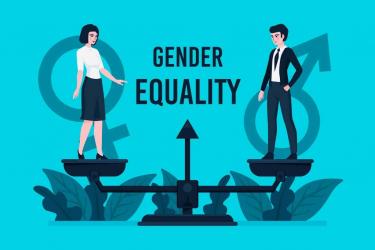Doha - The Arab Barometer’s latest report reveals concerning trends regarding gender equality in the Arab world, including Morocco.
The report, titled “Public Opinion Trends on Gender in the Middle East and North Africa,” was published on September 9.
The findings are based on more than 13,000 interviews conducted across the region between 2023-2024, with a margin of error of ±3 percentage points or less in each country.
According to the report, support for gender equality in the workplace has declined in several countries, including Morocco.
Between 2007 and the latest survey, support for equal work opportunities dropped by 11% in Morocco, reaching 64%.
While 90% of women in Tunisia and Lebanon support equality in job opportunities, only 71% of Palestinian women do, marking the lowest level of support among women.
This decline is driven not only by men but also by women, with Moroccan women being 11% less likely to support the statement on the necessity of gender equality in job opportunities compared to 2007.
Men in Morocco and Jordan are the least supportive of gender equality in the workplace, at 54% and 52%, respectively.
The report also highlights a growing support for the notion that men should have the final say in family decisions.
In Morocco, 61% of respondents agreed with this statement, the highest level of support since the Arab Barometer began its surveys.
The gap between men’s and women’s opinions on this matter is significant, with 70% of Moroccan men supporting the idea, compared to 53% of Moroccan women.
Moroccan women saw the largest increase in support for this idea, rising from 37% in 2022 to 53% in the 2023-2024 survey. In contrast, support among Moroccan men only increased by 3 percentage points, from 67% to 70%, during the same period.
In addition, the Arab Barometer found a concerning trend in perceptions of women’s ability to take on political leadership roles.
In Morocco, 57% of respondents believe that men generally make better political leaders than women, a sentiment shared by many across the region. This marks a significant increase from the previous survey in 2021-2022.
But there is still a strong desire to increase women’s representation in politics, with the majority in all surveyed countries supporting gender quotas in ministerial positions and parliamentary seats.
The majority also believes that having women in political leadership positions leads to better rights for women.
The report further reveals the positive impact of having close female relatives in the workforce on attitudes towards gender equality.
Across the region, both men and women with working female relatives hold more positive views regarding women’s authority within the household and their participation in politics.
The Arab Barometer is a research network established in 2006 to conduct rigorous and representative public opinion surveys across the Arab world.
The network aims to deepen public discussions and facilitate data-driven solutions to the pressing issues facing citizens in the Middle East and North Africa.
The report, titled “Public Opinion Trends on Gender in the Middle East and North Africa,” was published on September 9.
The findings are based on more than 13,000 interviews conducted across the region between 2023-2024, with a margin of error of ±3 percentage points or less in each country.
According to the report, support for gender equality in the workplace has declined in several countries, including Morocco.
Between 2007 and the latest survey, support for equal work opportunities dropped by 11% in Morocco, reaching 64%.
While 90% of women in Tunisia and Lebanon support equality in job opportunities, only 71% of Palestinian women do, marking the lowest level of support among women.
This decline is driven not only by men but also by women, with Moroccan women being 11% less likely to support the statement on the necessity of gender equality in job opportunities compared to 2007.
Men in Morocco and Jordan are the least supportive of gender equality in the workplace, at 54% and 52%, respectively.
The report also highlights a growing support for the notion that men should have the final say in family decisions.
In Morocco, 61% of respondents agreed with this statement, the highest level of support since the Arab Barometer began its surveys.
The gap between men’s and women’s opinions on this matter is significant, with 70% of Moroccan men supporting the idea, compared to 53% of Moroccan women.
Moroccan women saw the largest increase in support for this idea, rising from 37% in 2022 to 53% in the 2023-2024 survey. In contrast, support among Moroccan men only increased by 3 percentage points, from 67% to 70%, during the same period.
In addition, the Arab Barometer found a concerning trend in perceptions of women’s ability to take on political leadership roles.
In Morocco, 57% of respondents believe that men generally make better political leaders than women, a sentiment shared by many across the region. This marks a significant increase from the previous survey in 2021-2022.
But there is still a strong desire to increase women’s representation in politics, with the majority in all surveyed countries supporting gender quotas in ministerial positions and parliamentary seats.
The majority also believes that having women in political leadership positions leads to better rights for women.
The report further reveals the positive impact of having close female relatives in the workforce on attitudes towards gender equality.
Across the region, both men and women with working female relatives hold more positive views regarding women’s authority within the household and their participation in politics.
The Arab Barometer is a research network established in 2006 to conduct rigorous and representative public opinion surveys across the Arab world.
The network aims to deepen public discussions and facilitate data-driven solutions to the pressing issues facing citizens in the Middle East and North Africa.

